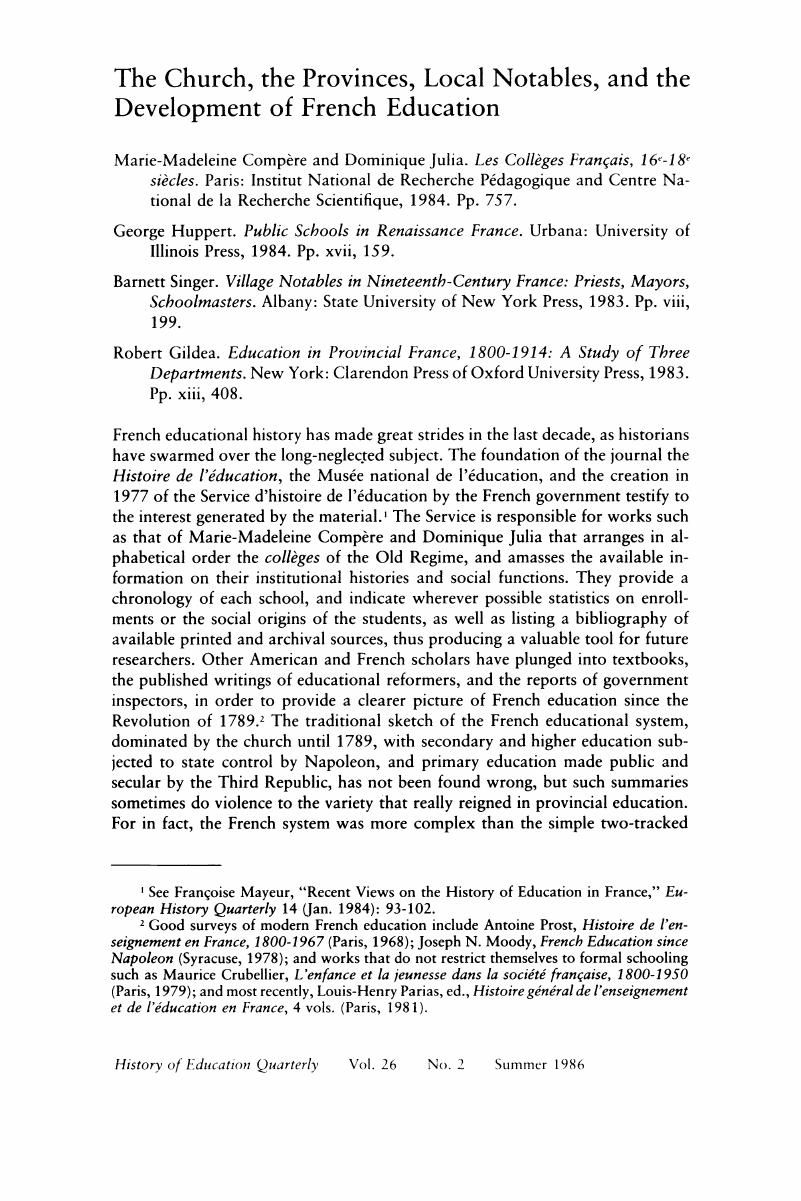No CrossRef data available.
Published online by Cambridge University Press: 24 February 2017

1 See Mayeur, Françoise, “Recent Views on the History of Education in France,” European History Quarterly 14 (Jan. 1984): 93–102.Google Scholar
2 Good surveys of modern French education include Prost, Antoine, Histoire de l'enseignement en France, 1800–1967 (Paris, 1968); Moody, Joseph N., French Education since Napoleon (Syracuse, 1978); and works that do not restrict themselves to formal schooling such as Crubellier, Maurice, L'enfance et la jeunesse dans la société française, 1800–1950 (Paris, 1979); and most recently, Parias, Louis-Henry, ed., Histoire général de l'enseignement et de l'éducation en France, 4 vols. (Paris, 1981).Google Scholar
3 This discussion was started in a session on Huppert's book at the 1984 meeting of the History of Education Society in Chicago.Google Scholar
4 See Weber, Eugen, Peasants into Frenchmen: The Modernization of Rural France, 1870–1914 (Stanford, Calif., 1976); and for accounts of the most recent studies, Weber, Eugen, “Comment la politique vint aux paysans: A Second Look at Peasant Politicization,” American Historical Review 87 (Apr. 1982): 357–89; and Margadant, Ted W., “Tradition and Modernity in Rural France during the Nineteenth Century,” Journal of Modern History 56 (Dec. 1984): 667–97.Google Scholar
5 On the social backgrounds of the village schoolmasters and the ambiguity of their desire to be local notables, while also being professionals tied to the Université de France, and of their desire to be agents of modernity, while fearing urbanization and industrialization, see Day, C. R., “The Rustic Man: The Rural Schoolmaster in Nineteenth-Century France,” Comparative Studies in Society and History 25 (Jan. 1983): 26–49.Google Scholar
6 Clark, Linda L., Schooling the Daughters of Marianne: Textbooks and the Socialization of Girls in Modern French Primary Schools (Albany, N.Y., 1984); and Strumingher, Laura S., What Were Little Girls and Boys Made Off: Primary Education in Rural France, 1830–1880 (Albany, N.Y., 1983).Google Scholar
7 Weber, , Peasants, 307–38, makes this observation in reference to the peasants, that schools could have little impact until they became useful to the rural populations.Google Scholar
8 Grew, Raymond and Harrigan, Patrick J., “The Catholic Contribution to Universal Schooling in France, 1850–1906,” Journal of Modern History 57 (June 1985): 211–47; also see Harrigan, Patrick J., “The Social Appeals of Catholic Secondary Education in France in the 1870s,” Journal of Social History 8 (Spring 1975): 122–41.CrossRefGoogle Scholar